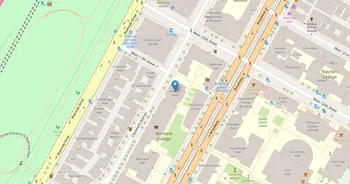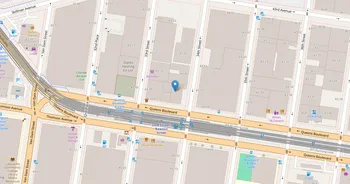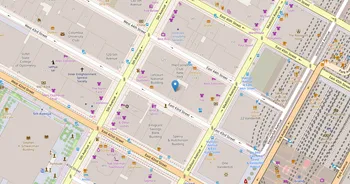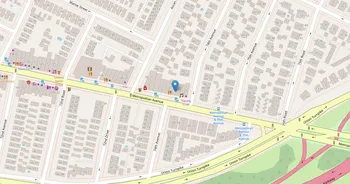Bard College : Overview, Courses, Scholarships & Rankings
About Bard College
Perched above the Hudson, Bard has a reputation for seminar-style learning that prizes independent thought, strong writing, and cross-disciplinary work. Students dig into the arts, social sciences, and sciences with close faculty attention. Studios, performance spaces, labs, galleries, and a well used library share space with advising, health and counseling, tutoring, and a hands-on career office.
Campus life leans creative and community minded: concerts, exhibitions, student theater, film nights, outdoor trails, and river views that pull you outside between classes. And the atmosphere feels exploratory but grounded, with a culminating senior project many talk about for years. Internships and visiting professionals tie students to the Hudson Valley and New York City. Local towns offer cafes, galleries, and volunteer spots. Notable names linked to the college include Donald Fagen and Walter Becker.
Key Institutional Details
Contact & Profile
Academic & Institutional
Academic Programs & Fields of Study
Bard College offers 16 degree programs across 8 major academic fields, graduating approximately 829 students annually. The most popular fields by graduate volume are Arts (4 programs, 238 graduates), Social Sciences (4 programs, 198 graduates), Liberal Arts (1 programs, 138 graduates), Interdisciplinary (2 programs, 88 graduates) and English (1 programs, 85 graduates). Explore program details, award levels, and graduate demographics below.
Arts (4 programs, 238 graduates)
Fine Arts, Design Studies and Creative Performance
| Program Name | Graduates | Gender Distribution | Award Levels | CIP Code |
|---|---|---|---|---|
| Studio Arts, General | 155 |
|
Bachelor's
Master's
|
50.0702 |
| Music Performance | 47 |
|
Bachelor's
Master's
|
50.0903 |
| Art History and Conservation | 32 |
|
Master's
Doctorate (R)
|
50.0703 |
| Music History, Literature, and Theory | 4 |
|
Master's
|
50.0902 |
Social Sciences (4 programs, 198 graduates)
Sociology, Anthropology and Political Science Studies
| Program Name | Graduates | Gender Distribution | Award Levels | CIP Code |
|---|---|---|---|---|
| Social Sciences | 167 |
|
Bachelor's
Master's
|
45.0101 |
| Social Sciences | 14 |
|
Master's
|
45.9999 |
| Econometrics and Quantitative Economics | 9 |
|
Master's
|
45.0603 |
| Economics | 8 |
|
Master's
|
45.0601 |
Liberal Arts (1 programs, 138 graduates)
Liberal Arts Education, General Studies and Humanities
| Program Name | Graduates | Gender Distribution | Award Levels | CIP Code |
|---|---|---|---|---|
| Liberal Arts and Sciences | 138 |
|
Associate's
|
24.0101 |
Interdisciplinary (2 programs, 88 graduates)
Cross-Disciplinary Studies and Integrated Research Programs
| Program Name | Graduates | Gender Distribution | Award Levels | CIP Code |
|---|---|---|---|---|
| Biological and Physical Sciences | 87 |
|
Bachelor's
|
30.0101 |
| Multi- and Interdisciplinary Studies | 1 |
|
Bachelor's
|
30.9999 |
English (1 programs, 85 graduates)
English Literature, Creative Writing and Literary Analysis
| Program Name | Graduates | Gender Distribution | Award Levels | CIP Code |
|---|---|---|---|---|
| English Language and Literature | 85 |
|
Bachelor's
|
23.9999 |
Business (1 programs, 55 graduates)
Business Administration, Marketing and Entrepreneurship
| Program Name | Graduates | Gender Distribution | Award Levels | CIP Code |
|---|---|---|---|---|
| Business Administration and Management | 55 |
|
Master's
|
52.0201 |
Education (2 programs, 16 graduates)
Educational Sciences, Teaching Methods and Pedagogy
| Program Name | Graduates | Gender Distribution | Award Levels | CIP Code |
|---|---|---|---|---|
| Secondary Education and Teaching | 11 |
|
Master's
|
13.1205 |
| Environmental Education | 5 |
|
Master's
|
13.1338 |
Natural Resources (1 programs, 11 graduates)
Environmental Science and Natural Resource Management
| Program Name | Graduates | Gender Distribution | Award Levels | CIP Code |
|---|---|---|---|---|
| Environmental Science | 11 |
|
Master's
|
03.0104 |
Admission Requirements & Test Scores
Comprehensive overview of admission criteria, standardized test score ranges, and application requirements for prospective students at Bard College.
Application Requirements
Data based on IPEDS for 2022-2023 academic year. Test score ranges represent the middle 50% of admitted students (25th-75th percentile). Requirements may vary by program.
Tuition, Fees & Estimated Costs
Overview of tuition rates, housing, and other annual education expenses for undergraduate and graduate students
Financial Aid & Student Support
Summary of scholarships, grants, student loans, and financial aid statistics for undergraduate students
Student Success Metrics
Graduation rates and post-graduation earnings to help assess student outcomes and long-term value of education.
Loan Burden & Repayment Outcomes
Breakdown of loan repayment rates and student debt levels by income and dependency status.
Frequently Asked Questions
Find answers to the most common questions about Bard College
How much does it cost to attend Bard College?
The annual tuition at Bard College is $63,612 for in-state students. When including room and board, books, and other expenses, the total estimated cost is approximately $84,852 for in-state students. Additional costs include room and board $18,040 (on) / $13,000 (off) and books and supplies $1,200.
Data based on IPEDS program completions for 2022-2023 academic year. Tuition and cost estimates are approximate and may not include all fees, personal expenses, or transportation costs.
What academic programs and degree levels does Bard College offer?
Bard College offers 16 academic programs across 8 major fields of study, with available degree levels: Associate's, Bachelor's, Master's, Doctorate (Research).
Most popular program areas include:
- Fine Arts, Design Studies and Creative Performance (4 programs)
- Sociology, Anthropology and Political Science Studies (4 programs)
- Liberal Arts Education, General Studies and Humanities (1 programs)
- Cross-Disciplinary Studies and Integrated Research Programs (2 programs)
- English Literature, Creative Writing and Literary Analysis (1 programs)
Data based on IPEDS program completions for 2023-2024 academic year. Numbers reflect programs where students graduated, not all offered programs.
What is the acceptance rate for Bard College?
Bard College has an 52.3% acceptance rate and a 11.6% yield rate, making it selective.
Admission statistics breakdown:
- Total applicants: 6,628
- Students admitted: 3,466
- Students enrolled: 402
Data based on IPEDS for 2022-2023 academic year. Admission statistics may vary by program and application cycle.
What financial aid and scholarships are available at Bard College?
Bard College provides financial aid to 19% of first-time, full-time students, with average grants of $56,380 and average loans of $7,145.
Average financial aid amounts by type:
- Pell grants: $5,100
- State/Local grants: $3,732
- Institutional grants: $54,213
- Federal loans: $6,150
The university supports 341 students with grants and 209 students with loans annually.
Data based on IPEDS for 2022-2023 academic year. Financial aid amounts and percentages may vary by program, enrollment status, and individual circumstances.
What is the average salary for Bard College graduates?
Bard College graduates earn a median salary of $31,072 after 6 years and $46,543 after 10 years.
The salary range 10 years after graduation spans from $22,114 (25th percentile) to $74,224 (75th percentile), with top earners reaching $77,000 (90th percentile).
Data based on IPEDS for 2022-2023 academic year. Salary data reflects graduates who received federal financial aid (approximately 60% of all graduates). Actual earnings may vary significantly based on program, location, and individual circumstances.
Related Universities




Found something useful? Help others discover it too! Share with friends, on social media, or save for later - every share helps someone find the information they need.